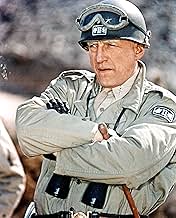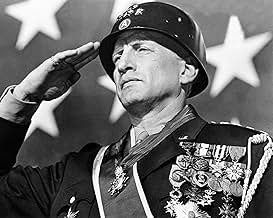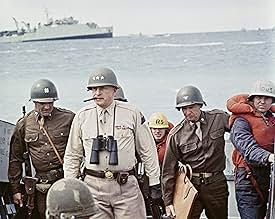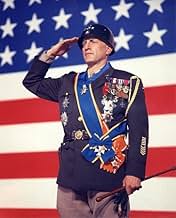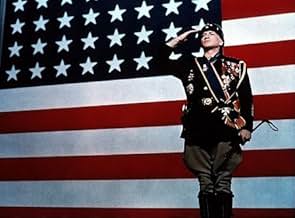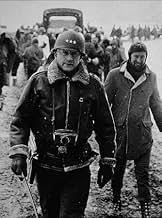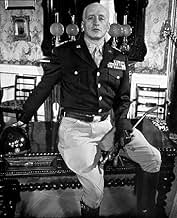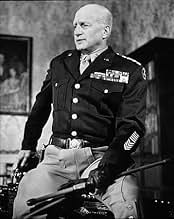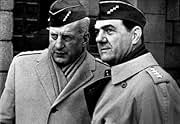Patton
- 1970
- Tous publics
- 2h 52min
La phase de la Seconde Guerre mondiale de la carrière du général américain controversé George S. Patton.La phase de la Seconde Guerre mondiale de la carrière du général américain controversé George S. Patton.La phase de la Seconde Guerre mondiale de la carrière du général américain controversé George S. Patton.
- Réalisation
- Scénario
- Casting principal
- Récompensé par 7 Oscars
- 25 victoires et 8 nominations au total
Carey Loftin
- General Bradley's Driver
- (as Cary Loftin)
Pat Zurica
- First Lieutenant Alexander Stiller
- (as Patrick J. Zurica)
Richard Münch
- Colonel General Alfred Jodl
- (as Richard Muench)
Résumé
Reviewers say 'Patton' is acclaimed for George C. Scott's compelling performance as General George S. Patton, highlighting his complexity. The film is lauded for its epic scope, Franklin J. Schaffner's direction, and powerful war sequences. However, some critics find it lacking in secondary character development and note its lengthy runtime. Historical accuracy is debated, with concerns over anachronisms and creative liberties. Despite these issues, 'Patton' is recognized as a pivotal war film, offering profound insights into leadership and the intricacies of war.
Avis à la une
RELEASED IN 1970 and directed by Franklin J. Schaffner, "Patton" stars George C. Scott as the charismatic general during his WWII campaigns in North Africa and Sicily, as well as France & Germany following the Normandy invasion. After the invasion of Sicily, Patton was reprimanded for slapping a cowardly soldier suffering battle fatigue (in real life it was two soldiers on separate occasions in the course of eight days in August, 1943). The fiery general was removed from command for eleven months while his junior in age and rank, Omar Bradley (Karl Malden), was selected to command the First United States Army for the invasion of Normandy.
Meanwhile, Patton was assigned to London as a decoy to deceive the Germans in a sham operation called Fortitude. The ruse was successful because the German High Command respected Patton more than any other Allied commander and deemed him crucial to any plan to invade mainland Europe. Immediately following the successful invasion, he was put in command of the Third Army in the final Allied thrust against Germany where the headstrong general, once again, proved his mettle as his forces favored speed and aggressive offensive action.
Patton was an interesting character who maintained a flashy larger-than-life image in order to encourage his troops; and he didn't hesitate to get his hands dirty with them. While other officers tried to blend-in with the troops on the battlefield, Patton brazenly displayed his rank insignia. He was a romantic who valued bravery and tenacity above all. All this is effectively conveyed in this ambitious war flick. It's interesting to observe the North African and European theaters of the war from the standpoint of the Allied generals, mostly Patton and Bradley, rather than the typical perspective of the infantry.
THE FILM WAS WRITTEN by Francis Ford Coppola with additional material from Edmund H. North (based on the factual accounts of Ladislas Farago & Omar N. Bradley). It runs 172 minutes and was shot in Spain, Algeria, Morocco, Crete and England, with the opening speech filmed at Bob Hope Patriotic Hall in Los Angeles.
GRADE: A-
Meanwhile, Patton was assigned to London as a decoy to deceive the Germans in a sham operation called Fortitude. The ruse was successful because the German High Command respected Patton more than any other Allied commander and deemed him crucial to any plan to invade mainland Europe. Immediately following the successful invasion, he was put in command of the Third Army in the final Allied thrust against Germany where the headstrong general, once again, proved his mettle as his forces favored speed and aggressive offensive action.
Patton was an interesting character who maintained a flashy larger-than-life image in order to encourage his troops; and he didn't hesitate to get his hands dirty with them. While other officers tried to blend-in with the troops on the battlefield, Patton brazenly displayed his rank insignia. He was a romantic who valued bravery and tenacity above all. All this is effectively conveyed in this ambitious war flick. It's interesting to observe the North African and European theaters of the war from the standpoint of the Allied generals, mostly Patton and Bradley, rather than the typical perspective of the infantry.
THE FILM WAS WRITTEN by Francis Ford Coppola with additional material from Edmund H. North (based on the factual accounts of Ladislas Farago & Omar N. Bradley). It runs 172 minutes and was shot in Spain, Algeria, Morocco, Crete and England, with the opening speech filmed at Bob Hope Patriotic Hall in Los Angeles.
GRADE: A-
My only complaint with this film is several of the battle scenes play way too long. The first one in N. Africa, especially, is tension-less muddle. Due to the narrative focus on the affairs of the generals the battles are not very good and after are hard to follow. This is exceedingly minor in context because of not only the fog of war but history is what history is. I mention this because despite this issue I rather like this film, despite Patton (the man) being a brute and authoritarian. He was not a 20th century man. That says more about him than the 20th century.
The screenplay is, easily, the best part of the film. By the use of sarcasm and pointed barbs the film manages to place Patton the man in the proper context and despite Patton the man being pro-war make an anti-war film; it is really a very clever piece of writing that allows both hawks and doves to be really engaged with the storyline (which largely handles the history well). Best of all, this use of irony and sarcasm allows the film to show Patton as a complex, paradoxical and hypocritical figure. Patton the man loved the smell of battle but couldn't understand why fine young men had to die in war. He is a man who read his Bible every goddamn day. It is a sight to behold the mess and contradictions Patton lived by. And the screenplay effortlessly keeps the viewer orientated of what is happening in the war.
Scott is of course tailored made for the role and he gives his best career performance. Malden is also really engaging. The technical aspects give the film its proper weight. This is an exemplar of what a biopic can be.
The screenplay is, easily, the best part of the film. By the use of sarcasm and pointed barbs the film manages to place Patton the man in the proper context and despite Patton the man being pro-war make an anti-war film; it is really a very clever piece of writing that allows both hawks and doves to be really engaged with the storyline (which largely handles the history well). Best of all, this use of irony and sarcasm allows the film to show Patton as a complex, paradoxical and hypocritical figure. Patton the man loved the smell of battle but couldn't understand why fine young men had to die in war. He is a man who read his Bible every goddamn day. It is a sight to behold the mess and contradictions Patton lived by. And the screenplay effortlessly keeps the viewer orientated of what is happening in the war.
Scott is of course tailored made for the role and he gives his best career performance. Malden is also really engaging. The technical aspects give the film its proper weight. This is an exemplar of what a biopic can be.
It really doesn't get any better than this one, for realism, casting, set, costumes, scenery..........and all based on a true story. I can see why Scott won Best Actor and the film won BEST MOVIE. Epic movie in all aspects. Every person should watch this movie...... to see what the troops of England and the USA went through during WWII. My father fought in the Ardens during the Battle of the Bulge and he said the scene when Patton was marching up to get the 101st, with the heavy snow in the trees and the 88's blasting the tops of the trees off, took him right back to the heavy fighting where he was severely wounded. It was that realistic. "Patton" is one of my favorite WWII movies and a possible stopping point if it comes up in my "Recommendations" when surfing. This has a little bit of everything going for it, including great acting (Carl Malden and George C. Scott), historically accurate feel, a good bit of drama, and even some humor. "Patton" is one of the best and most honored war films of all time. (8 Academy Awards, including Best Picture, 1970.)
10nabor7
Not much can be said of this movie that already hasn't been said. It captures the war, the man, and the conflict of the two. I thought the movie was very nicely tied together and I thought the reflections of Patton on the past was very necessary. Patton believed in reincarnation so in looking back at historical battles you can see how Patton developed his strategy. He was a student of great leaders and commanders and the movie developed that thought really well. The movie presented the characters, the actual war history, and the Germans extremely well and it is no wonder this movie received the awards it did. After watching this movie over and over again, I'm convinced that no one could have played Patton any better than George C. Scott. You can tell from the movie that he put everything he had into the character. My father-in-law was an officer under Patton in the 3rd. Army and has said over and again how realistic the movie is. I would recommend this movie to anyone looking for an excellent re-telling of WWII history.
The best comment on this film was made by my father. This was the last movie he saw in a theater. He had served under Patton in WW2 and said that Scott had nailed Patton's character and mannerisms so perfectly that halfway through the opening speech, he expected Scott/Patton to look down and say, "$@%#$@, Sears, get a haircut - your hair's too &#%#$%@ long!"
Oscars Best Picture Winners, Ranked
Oscars Best Picture Winners, Ranked
See the complete list of Oscars Best Picture winners, ranked by IMDb ratings.
Le saviez-vous
- AnecdotesThe movie begins without showing the 20th Century-Fox logo, or any other indication that the film is starting. At military bases across the US theater owners reported that soldiers in the audience would often stand up and snap to attention when they heard the movie's opening line ("Ten-hut!"), assuming it to be a real call to attention.
- GaffesContrary to the way it's portrayed in the film, the controversy over George S. Patton's Knutsford speech was not over his having insulted the Russians (in fact, the Army quickly revised the initial transcript of his remarks to reflect that he had mentioned them). It had to do with his talk of "ruling the world" after the war - members of Congress said he had no business as a general commenting on post-war political affairs, while others objected to the notion of the US, Britain or anyone else "ruling the world."
- Crédits fousOne of the very, very few Twentieth Century-Fox films in which that company's logo is not shown at all, beginning or end. The film simply begins with the opening speech, and the opening Fox logo is replaced with an in-credit text-only notice after the speech. However, recent television showings have added the logo (not on DVD prints), and the addition is obviously spliced in from another piece of film.
- Versions alternativesThe Italian version is approximately 20 minutes shorter and removes all scenes set in the German Military HQ and/or showing German officers: although the credits still include the names of German performers, like Karl Michael Vogler as Marshall Rommel, their characters never appear onscreen in the Italian release.
- ConnexionsEdited into Opération Cobra (1972)
- Bandes originalesTo the Colors
(uncredited)
Traditional bugle call used in lieu of the National Anthem. Played at the opening scene.
Meilleurs choix
Connectez-vous pour évaluer et suivre la liste de favoris afin de recevoir des recommandations personnalisées
Détails
- Date de sortie
- Pays d’origine
- Site officiel
- Langues
- Aussi connu sous le nom de
- Patton: A Salute to a Rebel
- Lieux de tournage
- Cabo de Gata, Almería, Andalucía, Espagne(desert scenes)
- Société de production
- Voir plus de crédits d'entreprise sur IMDbPro
Box-office
- Budget
- 12 000 000 $US (estimé)
- Montant brut aux États-Unis et au Canada
- 61 749 765 $US
- Montant brut mondial
- 61 749 765 $US
- Durée
- 2h 52min(172 min)
- Couleur
- Rapport de forme
- 2.20 : 1
Contribuer à cette page
Suggérer une modification ou ajouter du contenu manquant



